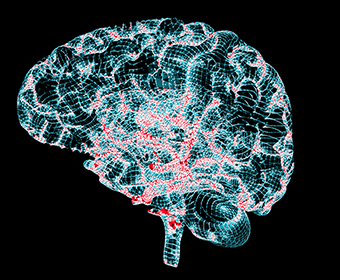
(July 31, 2017) -- Hyoung-gon Lee, the John H. Doran Distinguished Professor in Peripheral Neuropathy at The University of Texas at San Antonio (UTSA), is pursuing a new frontier in Alzheimer’s disease research.
Lee’s Alzheimer’s work has mainly been focused on understanding how brain cells degenerate during the disease. His current work suggests that there may be a new way forward in preventing and treating the illness.
“Once a neuron is born in the brain, division stops,” Lee said. “That’s a unique characteristic of neurons. Other types of cells regenerate after they’re damaged, but when neurons die, we’ve lost them.”
This is one of the reasons why Alzheimer’s and other neurodegenerative diseases have such disastrous effects on the health of the human brain. The neurons, once damaged by the disease, are unable to heal themselves.
Lee’s recent research, however, suggests that the neurons in an Alzheimer’s brain attempt to divide before they die. He’s now working to understand why.
“In normal, healthy neurons, the capability to divide is not active at all,” he said. “A normal brain cell has no cell cycle activity, but in Alzheimer’s-affected brains, it looks as if neurons are trying to divide.”
“It’s paradoxical,” he added. “But it could be the key to solving a great medical mystery. Knowing more about Alzheimer’s disease will make it much easier to fight it because we’ll have a better understanding of the specific cause.”
Lee and his laboratory are now developing an animal model to take a closer look at neuron death in Alzheimer’s-affected brains.
Lee’s laboratory is just one of several dozen at the university specializing in brain health, an extensive initiative that includes research in neurodegenerative disease, traumatic brain injury, regenerative medicine, stem cell therapies, medicinal chemistry, neuroinflammation and drug design.
This work is conducted across five top-tier UTSA research centers, including the UTSA Neurosciences Institute, the San Antonio Cellular Therapeutics Institute, the South Texas Center for Emerging Infectious Diseases, the Center for Innovative Drug Discovery and the Institute for Health Disparities Research.
Leading the brain health revolution is one of UT System Chancellor William McRaven’s “Quantum Leap” initiatives to provide the citizens of Texas the very best in higher education, research and health care. Chancellor McRaven has worked to make unprecedented investments in leveraging and connecting all the cutting edge science ongoing at UT institutions to drive collaboration and expand research efforts in brain health to meet a growing demand.
UTSA is ranked among the top 400 universities in the world and among the top 100 in the nation, according to Times Higher Education.
Learn more about the brain health research at UTSA.
Learn more about the UTSA Department of Biology.
Connect with UTSA online at Facebook, Twitter, YouTube, Instagram and LinkedIn.
UTSA Today is produced by University Communications and Marketing, the official news source of The University of Texas at San Antonio. Send your feedback to news@utsa.edu. Keep up-to-date on UTSA news by visiting UTSA Today. Connect with UTSA online at Facebook, Twitter, Youtube and Instagram.
Join the doctoral candidates for the Doctoral Conferreal Ceremony and celebrate their accomplishments.
Arts Building Recital Hall, Main CampusCelebrate the graduates from the Carlos Alvarez College of Business, College of Education and Human Development, Margie and Bill Klesse College of Engineering and Integrated Design and University College.
AlamodomeCelebrate the graduates from the College for Health, Community and Policy, College of Liberal and Fine Arts and College of Sciences.
AlamodomeThe University of Texas at San Antonio is dedicated to the advancement of knowledge through research and discovery, teaching and learning, community engagement and public service. As an institution of access and excellence, UTSA embraces multicultural traditions and serves as a center for intellectual and creative resources as well as a catalyst for socioeconomic development and the commercialization of intellectual property - for Texas, the nation and the world.
To be a premier public research university, providing access to educational excellence and preparing citizen leaders for the global environment.
We encourage an environment of dialogue and discovery, where integrity, excellence, respect, collaboration and innovation are fostered.